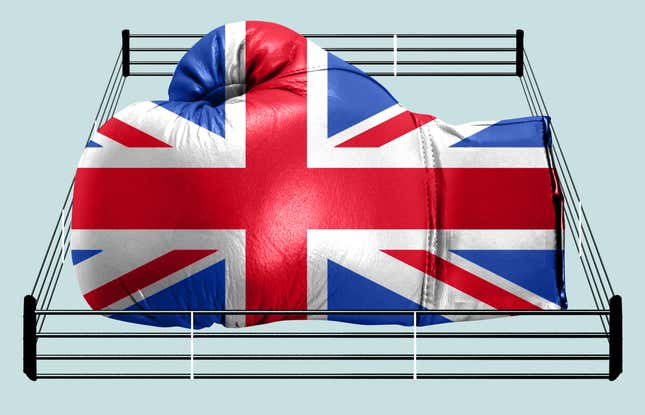
Boxing in the United Kingdom is rapidly moving toward a golden age, its first since before the start of the 20th century. More titles are currently held by Englishmen, Welshmen, or Irishmen than at any time since the sport went international. Some of these champions, like Sheffield’s Kell Brook, Belfast’s Carl Frampton, Harlesden’s James DeGale, and Hertfordshire’s Anthony Joshua, are genuinely world class-fighters, the best or second-best in their weight divisions. Neither Joshua nor DeGale have to look outside Britain to earn many millions of pounds. Their best economic interests are served by staying in England and taking on homegrown opponents: David Haye or (if he can get him) Tyson Fury for Joshua, George Groves or Callum Smith for DeGale.
Additionally, Nathan Cleverly, Lee Selby, Billy Joe Saunders, Andy Lee, Scott Quigg, Ricky Burns, Anthony Crolla, and Terry Flanagan all either currently hold or have recently held world titles.
There’s a broad palette from which to paint, and British promoters Eddie Hearn and Frank Warren have choices about whether to go big and ambitious, or make good safe money sticking to local landscapes. Of course, each can do both.
Making a mountain (of money) out of a molehill
On a recent Saturday night, after bouncing overweight, ill-trained, and under-motivated cruiserweight challenger B.J. Flores off the canvas four times in three quick rounds, Tony Bellew got right down to business, vaulting over the top rope to go after former heavyweight titleholder David Haye, who was conveniently standing close enough to ringside to have been able to catch his would-be assailant in a Lucha Libre maneuver, had things come to that.
Within seconds of the finish of what had been a relatively unimportant fight, the beginnings of a promotion sure to bring in one of the largest gates, if not the largest, in British boxing history had begun. It’s worth noting that this upcoming fight will also, in simple fistic terms, be a relatively unimportant one, and a terrible mismatch.
In light of the money it will draw, these last two points are important. Why would a localized fight between weight-mismatched opponents, neither of whom has ever quite established himself as an elite fighter, with no title on the line, command this kind of attention and draw so much money?
For one thing, Bellew and Haye are sensational talkers in opposing and complementary ways. Bellew wears his heart on his sleeve. He cries and roars, and enthusiastically participates as one of the crowd. From the moment a fight is signed, Tony Bellew is all-in in every imaginable way. Haye is affable enough, but painstakingly presents himself as aloof. For those disinclined to like him, this reads as, “He thinks he’s better than me.”
David Haye is disconcertingly good looking. And like every disconcertingly good looking fighter of semi-recent vintage (Muhammad Ali, Ray Leonard, and Oscar De La Hoya come to mind), part of his audience consists of male fans sufficiently outraged by the genetic unfairness of someone so good-looking being able to beat them up that they will pay to deputize a paladin to right this cosmic inequity.
Even during his fire and brimstone bombardment of Haye, Tony Bellew—an actual movie star marketed in large part on his looks—made a brief detour to concede, “I have a little more fat, and he’s a bit better looking than me.”
Whatever happens in the fight (and it’s a near lock that Haye wins it fast), it’s going to be explosive while it lasts. There’s no chance of it going to a decision, and little of it seeing the fifth round. Both guys can really punch—Haye brought his cruiserweight power up a division, Bellew may not do that—and neither has a dependable chin or entirely reliable defense. Unless Haye knocks Bellew flat in the first minute or so, they’ll both take some hard shots. That’ll produce enough ooohs and aaahs to give viewers their money’s worth.
It’s not the kind of fight that will prompt a rematch. If Haye wins, he goes straight for the title, where he and Joshua will split the contents of Fort Knox. If the miraculous happens and Bellew wins, add to that amount whatever the mint in West Point has sitting around its coffers, as he takes the route of casting himself as David to Joshua’s Goliath. If Bellew loses to Haye, he goes back to his “proper” weight division, beaten perhaps, but unbowed, all the more heroic for his efforts.
Evening up the playing field, and then unevening it again
During the past year, two of Eddie Hearn’s fighters have made dramatic jumps in weight in order to compete in lucrative fights. Assuming that his fight with David Haye comes off as expected, Tony Bellew will be the third.
Both Kell Brook and Amir Khan bulked up in ways that made one look like a weekend bodybuilder and the other like a chubby little man. Brook was said to look “bigger than Golovkin” and Khan was “nearly Canelo’s size.”
Brook’s gutsy move added to what was already a complex stew of national pride, misgiving that approached dread, and cynicism that had been set in motion by an earlier, even more weight-skewed bout between Khan and boxing’s current pound for pound biggest draw, Saúl Álvarez.
That fight had been a blatant money grab, brilliantly orchestrated at first by the incessant self-promoter Khan and followed enthusiastically by Matchroom and Golden Boy, with both companies seeing the something-for- nothing wisdom in pushing the thing through.
Khan, notoriously unable to absorb a hard shot and not much of a puncher at any weight above 135, had to take on an iron-chinned opponent who would enter the ring at 175 pounds. It seemed a preposterous notion. Still, interest in the matchup took hold all through England and even resonated as a curiosity beyond its shores.
Khan, demonstrably outweighed and outsized by Álvarez, boxed his slow and predictable opponent’s ears off for four rounds, right up to the moment he got hit with a solid shot for the first time. He fell straight back, hit the canvas hard, and lay perfectly still as he was counted out. The single punch had knocked him cold.
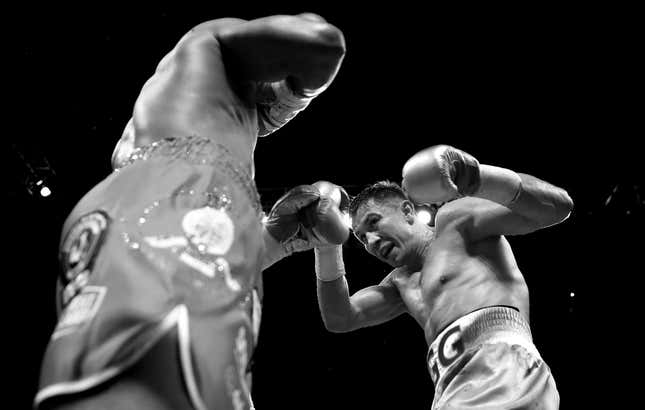
In September, Sheffield’s undefeated welterweight champion Kell Brook moved up to 160 pounds to take on Gennady Golovkin, also undefeated, and almost universally acknowledged to be the best middleweight in the world. He was unquestionably the most avoided.
Brook fought competitively and intelligently against Golovkin. There was nowhere near the size disparity that had been evident between Khan and Álvarez, although it was apparent that Golovkin was the bigger-boned, physically more imposing combatant. And his punches did immediate and alarming damage; a single shot broke Brook’s orbital bone, which ultimately led to his trainer Dominic Ingle throwing in the towel during the fifth round. Even on two scorecards and ahead by two points on the third, Brook had already begun to wilt slightly under Golovkin’s pressure. The timing of the surrender—an honest and non-cynical assessment of the conditions that existed in the ring—couldn’t have been better timed to suit Brook’s best promotional interests.
After their respective fights, both Khan and Brook were immediately deemed “much too small” to have taken on such formidable opponents above their natural classes. No collateral marketing damage had taken place with either. If anything, both gained stature from their losses, and both had ready-made lucrative challenges available to them in their “own” divisions.
It was as if all the pre-fight talk about their being as big as or bigger than their opponents had never taken place. Now the narrative was built entirely on the bravery it took to get into the ring with opponents so much bigger than themselves. In order to be truly great, you had to challenge yourself. Ipso facto, their losses made them truly great.
Every Brit loves (and expects) a plucky loser, or, The British school system
In the US, regional and national titles hold little interest to viewers. They are used mostly as vehicles for generating sanctioning fees and for maneuvering fighters up the rankings, positioning them to fight for world championships.
Not so in the UK, which has a kind of feeder system that is much more developed and transparent than any found in the US. As in the British school system, there are tangible goals that can be achieved at each level, and young boxers are carefully brought to them step by step by their elders. Even the journeymen fighter the prospects are expected to beat as they ascend the rankings have the air of gentlemen’s gentlemen, politely going the distance with their charges, occasionally issuing a correction or two. The theory is that the youngsters will learn as they go, during which time people can get a good look at them, and those who need to know such things can form progress reports.
Until recently, boxing people in the UK—professionals and fans alike—had an inferiority complex regarding their fighters, even as they harbored optimistic hopes for them. The sense was that a talented local kid could be brought along to the point where he’d challenge for a world title against a more talented, scary black American, a vicious body punching Mexican who’d turned pro at 12, a classy, ring- savvy Cuban with 900 amateur fights, or a hard-scrabble Eastern European who’d grown up without hot water, and be decimated in whichever manner was culturally endemic to whoever was administering the beating. It goes without saying that the Brit or Irishman was expected to be brave in battle, then gracious in defeat, even if he didn’t last long. Losing brought no collateral damage under the circumstances. Matthew Macklin and Martin Murray were both lionized for simply having the courage to get in the ring with the grinning nightmare Gennady Golovkin, (a fighter who legitimately combined the daunting aspects of each of the boxing cultures most feared by the British. Murray damn near received a knighthood for lasting into the 11th, despite having been dropped three times and not winning a round.
Because world titles are almost never unified anymore, champions don’t necessary represent the best in their weight division. Rather than having the best fight the best to establish supremacy, who fights whom is largely strategic, determined by star power, confidence in a fighter’s ability to hang onto the crown versus a prospective opponent, and—more often than not—what can be gotten away with. The formula is nearly always a calculation of risk/reward.
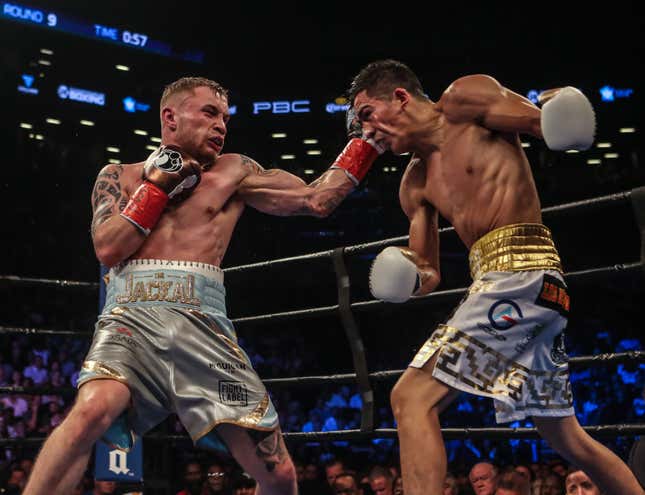
This is a way of saying that, with the judicial application of selection, UK champions can hold onto their titles through multiple defenses, moving themselves out of second-class citizenship. Being a title challenger who goes down to brave defeat in a title quest is no longer the aspiration. The goal now is to win the title, then figure out what your smartest move is for defending it.
Welshman Lee Selby has won his IBF featherweight title close to home, taken a brief journey to the States to defend against shopworn Fernando Montiel, and then headed back to the UK. He’s spent a career decisioning solid, but not dangerous, opposition. It’s been a prudent course of action for a good but unexceptional finesse fighter.
His divisional rival, Belfast’s Carl Frampton, took greater risks, first by beating Scott Quigg, undefeated at the time and seen as a genuine threat to his UK supremacy, and then journeying to New York to beat the estimable Léo Santa Cruz, likewise undefeated, in a fight of the year candidate that combined toe-to-toe action with some impressive brainwork by the Irishman.
The decision for Frampton was close, and there are good arguments for Santa Cruz having won. In a move that solidifies his status as a true world champion, Frampton will fly back to the US just after the new year—this time to Las Vegas—to attempt win the rematch more convincingly.
I’d like to think that everyone involved in this enterprise has their thinking cap on, and will make sure Santa Cruz gets the nod if this fight proves to be as close and fiercely contested as was the first (which it’s nearly certain to be).
Playing it that way will allow the rivals to have their rubber match in Belfast, where each will earn at least twice what they’ve ever previously made.
It will also allow the eventual winner to claim that he’s the best featherweight in the world.
This conveniently (and intelligently) leaves the actual best featherweight, Guillermo Rigondeaux, out of the conversation, and, as always, out in the cold. But boxing is a business first; what is true is what makes sense financially, and what you can get people to believe.
Matchroom Boxing
Successful boxing promotion is a strenuous profession. It keeps you on the phone all day, every day. It requires constant travel, an ongoing reconfiguration of plausible bullshit narrative as opponents are signed, drop out, and are replaced by others, a sophisticated understanding of TV buy numbers, and—increasingly—social media savvy. The other promoters try to fuck you over, as you in turn try to fuck them over. If you’re a successful boxing promoter, you work like a dog.
A persuasive case can be made for Eddie Hearn, managing director of Matchroom Boxing, being the leading promoter in boxing today. Still in his 30s, he has been around the business his entire life, where he learned its ins and outs from his father, Barry Hearn.
Like every promoter not named Al Haymon, Hearn likes keeping his face in the frame. He affects a stylishly maintained half-beard, wears the expensive, slightly too small suits favored by fashionable Brits, and rattles off up-to-the-minute sound bites in a vaguely cultivated street accent. Unlike most promoters, he has an aptitude for assessing boxers and fights, and he keeps his finger on the pulse of what’s going on at every level of the game, primarily throughout the UK, but with a sharp awareness of the worldwide scene.
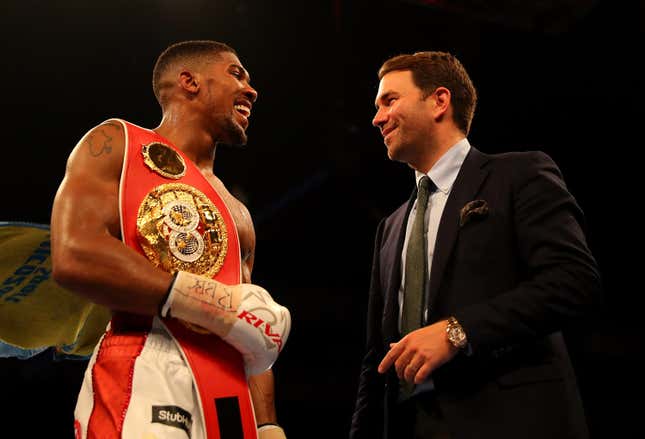
In the UK, there’s no question that he holds the keys to the kingdom, the castle, and the highway, promoting heavyweight champion Anthony Joshua, who, if the love England has shown its past heavyweight champs and failed contenders is any indication, could wind up financially eclipsing anyone who has come before him.
Eddie Hearn uses Twitter a lot. He hypes his fights there, uses it to speculate chidingly about why fighters outside his stable aren’t signing on the dotted line, and engages in running squabbles with other Twitter users who cynically—and often correctly—see questionable motives in some of his promotional maneuvers.
Although emotions tend to run high in these exchanges, and there appears to be a good deal of mutual rancor involved, the interaction is an effective promotional tool. Engagement in any form is a type of recognition; an offended Twitter retort from Eddie Hearn means he heard you. UK fans might bitch at Matchroom Boxing’s cards and the opponent choices for its elite fighters, but they always tune in when his shows air.
There’s a boxing axiom: “As go the heavyweights, so goes boxing.” At the moment, Eddie Hearn has the best heavyweight in the world, Luis Ortiz, riding shotgun for the next-best heavyweight in the world, Anthony Joshua. Joshua is the real cash cow here, and one capable of handling anyone other than Ortiz, whom he will fight only when Hearn believes it’s propitious for him to do so. (That day may never come.) There is no way to overestimate the kind of leverage Hearn gets in having these two fighters working under the Matchroom Boxing promotional banner.
If you don’t have a major fight brewing, all politics is local
The Matchroom-promoted Sam Eggington vs. Frankie Galvin fight which took place in Birmingham recently was representative of one of the ways British boxing’s revitalization is taking place: Two local fighters, neither great, fought for neighborhood bragging rights (more or less), and poured their hearts into their work in front of a large, engaged, savvy, and entirely entertained crowd.
That the fight was sensational was lagniappe, since it allowed for what surely would have been a one-off between one fighter nearing the end of the line and the other lacking the world-class talent to get beyond the regional level to move onward. This, even after promoter Hearn had said that the loser “has got nowhere to go.”
What was fascinating about the bout was its substantial and fervent social media presence during its buildup, as it was happening in real time, and after it had concluded.
Galvin had been a celebrated amateur seen as a real prospect, but lacked good training habits, often being forced to lose vast amounts of weight days before his fights. For this fight, he failed to make 147; if he won, he would not get the minor belt that was on the line.
It was understood that he was a better fighter than Eggington—more naturally gifted, more experienced against stronger opposition, and possessing a higher ring IQ. Even the fact that he’d been easily taken apart by Kell Brook spoke in his favor: Eggington would have never been brought closer to Brook than standing in line for his autograph.
That Galvin was better, and that he was lazy about his talent, provoked online criticism, some of it very funny, a little of it vituperative, but all of it well informed. Social-media interest continued to pick up as fight time grew nearer. When it was announced that Galvin failed to make weight, public sentiment moved irrevocably against him. It was a strange kind of rejection—more disappointment than anger. A prized black sheep had fucked up again.
The fight itself was pure tortoise versus hare. It was clear from the start that Galvin was in lousy shape, that he knew it, and that he was going to try to control the tempo of the fight, pick his spots, and use tricks of the trade to lure the full speed ahead Eggington into making costly mistakes. He had some success, but in the third round he was dropped, and it became obvious he wouldn’t be able to go 12. It was here that Galvin decided that, if he was going to lose, he would go down swinging. He went to war, still trying to find pockets of calm where he could regroup, but, once rested, reengaging with a vengeance.
The fight got better and better. As it did, anyone who cared about such things forgot that they were watching two guys who were little better than good club fighters. That didn’t matter anymore. It was impossible not to care about what you were seeing.
It ended in the 8th, with the excellent referee Victor Loughlin waving things off after Galvin had been dropped again and had reached the end of his endurance.
The fight then moved seamlessly from the active stage to phase two of promotion when each fighter—with Eddie Hearn hovering visibly beside them—praised the other genuinely and winningly. Galvin said, “We’re friends again. But don’t get me wrong; I want to do it again.” Hearn, questioned about his statement that the loser should retire, took back what he’d said, responding “Absolutely not, not after a fight like that. Massive credit to Sam and Frankie … love to see it again.”
So will everyone who saw it the first time. There’s virtually no counterpart to this in the US: Through a combination of making a good fight, emotional investment by local fans, vigorous promotion, and ongoing internet conversation, two fighters who may well not be in the top 20 in their divisions have walked themselves into the kind of paydays that guys of their stature seldom see. It’s a good thing all around.
Big stuff
Historically, heavyweights have commanded larger paydays than fighters in lighter weight divisions. There’s an absolutism in size that implies that being the heavyweight champion is the same as being toughest person on earth, so title unification is enormous business.
In November, 2015, Tyson Fury—a smart, deeply bigoted, funny, manic depressively free thinker—walked into the stacked deck of Dusseldorf, Germany and improbably won the lineal heavyweight title—the real title—from the aging multilingual jet-setter Wladimir Klitschko, who’d held it for a decade.
“Won” might not be quite the right term, since virtually no fighting took place during their 12 rounds together. Fury threw a handful of punches, Klitschko, far fewer.
Nevertheless, the title was now Fury’s, and with it he doubled down on his ambition to be a controversial and divisive figure.
Half a year later, novice heavyweight Charles Martin, who had literally won his piece of the title due to clumsiness when his inept opponent, Vyacheslav Glazkov, tripped over nothing, injured his knee, and had to withdraw, was paid three million dollars to fly to London in order to endure one hard punch. That punch—a beauty— knocked him out, as everyone knew it would. Martin quietly handed his IBF belt over to Anthony Joshua, providing the new champion and Eddie Hearn with one more sizable bargaining chip and then flew back to Los Angeles, where he was almost immediately shot during a street argument, returning to life as he knew it.
Joshua, waiting for huge things to happen with either Fury or Haye, stayed busy, beating the shit out of poor Dominic Breazeale, who showed more character in losing than he had in all of his previous artless wins.
Until last month, there were two British heavyweight champions—Tyson Fury and Anthony Joshua, perched on the threshold of a unification fight that may have put 20 million dollars into each of their pockets.
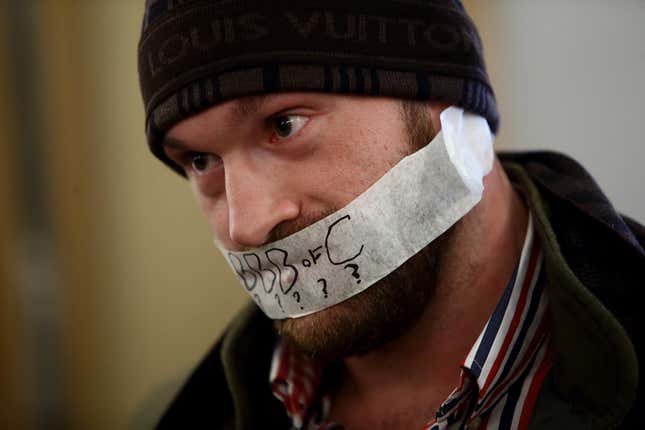
But Fury has now “officially” retired, which means that he may or may not have actually retired. (If he hasn’t, he needs to get back in the ring very soon, while the demand for unification with Joshua is at its most fervent, and before his disinclination to train combines with his bad habits and love of food and drink to cause him to balloon up to 350 pounds, making him unrecoverable.)
Fury had been scheduled to take a rematch with Wladimir Klitschko when he dropped out of the picture. A quick agreement for a blockbuster matchup between Joshua and Klitschko seemed to satisfyingly fill the vacuum made by his departure, but it turned out too good to be true. For whatever the real reasons may have been, Klitschko backed out of the fight.
His replacement was initially slated to be the hapless Englishman David Price, an opponent who would be laughed out of any arena in the world other than the M.E.N. in Manchester. Luckily for him that was where the fight was set to take place. Price, it seems, has now been ditched in favor of Eric Molina as Anthony Joshua’s next opponent, but he can probably still be used as a figurehead for how a certain portion of the UK’s boxing public views no-hope opponents who happen to have been born on local soil.
Price’s career trajectory and general evaluation exemplify the ways that British fight fans are quick to elevate their heavyweights to star status but slow to see how grossly they’ve overshot the mark.
Knocked silly by light punching Tony Thompson, who was brought in to lose, Price’s brain trust scheduled an immediate rematch to put things right. This would have been a shrewd move if they’d had the sense to fix the fight. They didn’t, and Price was convincingly separated from his senses once again in a fight that should have put the finishing touches to a failed career.
Like a car with a manufacturing defect, Price was taken off the assembly line for retooling, with an accompanying line of amelioration: “He’ll be back, better than ever.”
He came back as David Price, and was once again knocked out in slow-motion replay fashion.
Stiff upper lip Brit Third-Time’s-the-Charm rationale found him matched against the spellbindingly bad Croatian Ivica Perkovic—a fight that placed him back into the winner’s circle—and allowed him to finally crawl over the finish line into a title shot.
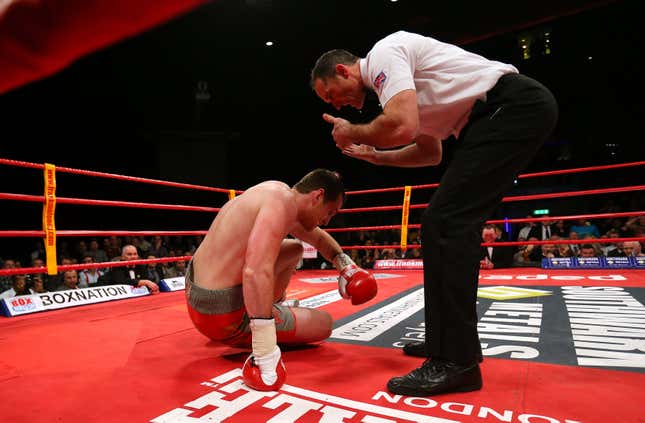
Most places, all this would have been greeted by groans of dismay, if it was acknowledged at all. And, although the match-up was greeted by groans of dismay in England, they were somehow enthusiastic ones; the fans knew that, once again, they would have to summon up enormous collective will in order to embrace this fiasco. The great thing is that they were perfectly capable of managing it.
Here’s the irony: They’re not boxing rubes. They’re a much more knowledgeable viewing audience than their US counterparts. They can understand a fight to be a dud on one level while also understanding that, seen as a bragging-rights local fight writ large, it could be a lot of fun. And as an act of national solidarity, they will consciously allow bullshit to be part of their entertainment, and elect to enjoy the show.
After Joshua’s next win, which shouldn’t take more than six minutes minus ring entrances, the heavy lifting of building two superfights begins.
David Haye has already set his sights on Joshua and begun his end of the promotional process. He doesn’t own a piece of any title to throw into the pot, but he’ll easily be able to present his case to the public. Taking the high road, he’ll talk about Anthony Joshua as a great champion, a great fighter, and a great guy who is a credit to the sport. Then we’ll get the buts; that maybe Joshua’s chin isn’t so good, that it hasn’t been tested by a punch anything like the Hayemaker, that he’s gotten the title too soon against too weak opposition, that Haye himself has been at the top of the mountain for a long time (not exactly true), and that he knows what it takes to stay there. He’ll conclude by declaring Joshua not ready just yet.
All Joshua has to do is talk about how he welcomes the challenge from one of the legends of the sport (an assessment that is also not exactly true), that a champion has to test himself against the best, that he promises a spectacular show, and that beating Haye represents the passing of the torch from one great heavyweight to another.
Doing this will produce the biggest-money fight in British boxing history, but it’s still not the biggest fight that could take place there. That monster of monsters belongs to Joshua versus Fury. There’s almost no limit to what that event could draw.
If we’re to believe Fury, that fight won’t take place.
Everybody with the even the most tangential connection to either fighter is praying that it will. And there must be power in collective prayer, since this fight will surely take place because, aside from putting a quick kayo loss on Fury’s record (something that even he might not care about at this point), it has literally no downside. It’s the most important heavyweight bout in the last few years. It’s for the lineal title. It firmly puts and locks up that title in the UK (since Matchroom now has Luis Ortiz under its banner, Hearn gets to keep him away from Joshua, since Anthony has little worry about keeping the belt when taking on anyone else).
Most importantly, it offers a panoply of options for its promotion, ranging from soap opera to morality play the drama of bona fide heavyweight title legitimacy:
Option A: You can see Anthony Joshua as the future of heavyweight boxing, potentially, the nation’s most dominant champion ever at that weight. He can be held up as a role model for the sport and for kids. He’s a destroyer who no one can stand up to—the real version of his fake US counterpart Deontay Wilder. He’ll be the undisputed heavyweight champion as soon as he can get the other title holders into the ring with him, and will then keep the title for years to come.
Option B: He’s an inexperienced, pampered coward who has been gently guided to the title, and not required to prove anything along the way. He’s stiff and robotic—a guy whose chin looked suspect, and who froze, the only time he was really tagged by anything halfway decent. Put in with genuine competition, he will be exposed as the pretender he is.
Fury is far more polarizing than Joshua.
Option A: He’s a hedonist iconoclast who says what he thinks, takes on boxing’s power structure and wins, and owns the legitimate heavyweight title by having won it in the ring over a long established champion. He’s never lost a fight, he’s difficult to take out of his style, and he moves well for a man of such enormity. He’s a great interview, he’s funny as hell, and he’s got one of the most incredible back stories imaginable.
Option B: He’s a misogynist, anti-Semitic fat piece of shit who opposes gay people. He’s willfully and proudly ignorant and boorish. His win over Wladimir Klitschko came not as a result of any skill on his part, but due to Klitschko growing old overnight and refusing to make an effort to win. Fury can’t punch at all, won’t train, and has been decked by Steve Cunningham, an overblown cruiserweight not known for his power. He has often looked clumsy and nearly inept. His singing voice sucks. Anthony Joshua will knock him out with the first serious punch he throws in the opening round.
I have an opinion about the fighters, and about how the fight will go once Fury has the business sense to take it. But my opinion is beside the point here; everyone with even a passing interest in boxing will have strong opinions about the fighters and the fight.
This is the point at which an argument can be made that the UK has stepped over the US to become the most vital and influential region of the world for professional boxing.
Charles Farrell has spent most of his professional life moving between music and boxing (with a few detours along the way). He has managed five world champion boxers and has 30 CDs listed under his name. His essay “Why I Fixed Fights” will be included in the boxing anthology The Bittersweet Science: Fifteen Writers in the Gym, in the Corner, and at Ringside, edited by Carlo Rotella and Michael Ezra, and published by the University of Chicago Press. He is featured in the 2016 film Dirty Games, directed by Benjamin Best.